
Beetle Control Experts in Charleston, SC
Charleston’s historic charm comes with a humid, subtropical climate and lush landscaping that beetles love. Warm temperatures, frequent summer storms, shaded beds of pine straw, and raised homes with ventilated crawl spaces create pockets of moisture and shelter where beetles can feed, breed, and hide. Whether you live in a historic single house on the Peninsula, a raised cottage in West Ashley, a townhome on Daniel Island, or a family home in Mount Pleasant, James Island, Johns Island, North Charleston, Hanahan, Goose Creek, or Summerville—plus the barrier islands Folly Beach, Sullivan’s Island, and Isle of Palms—the risk is the same: beetles damage fabrics and finishes, contaminate pantry goods, and, in the case of wood-boring species, can quietly undermine trim and flooring.
All U Need Pest Control provides beetle control in Charleston, SC that’s fast, discreet, and tailored to Lowcountry homes. Our licensed technicians identify the exact species, locate harborage and moisture sources, and implement an Integrated Pest Management (IPM) plan that solves today’s problem and prevents tomorrow’s. Expect clear prep instructions, family- and pet-conscious treatments, and follow-through that keeps your home protected through storm season and the long warm months. Call 1 (888) 239-BUGS (1-888-239-2847) for a free inspection.
Pest Control Services in Charleston, SC
- Ant Control
- Bed Bug Control
- Cockroach Control
- Flea Control
- Home General Pest Control
- Hornet Control
- Millipede Control
- Mosquito Control
- Pantry Pest Control
- Rat & Rodent Control
- Scorpion Control
- Silverfish Control
- Spider Control
- Stink Bug Control
- Termite Control
- Tick Control
- Wasp Control
- Winter Control
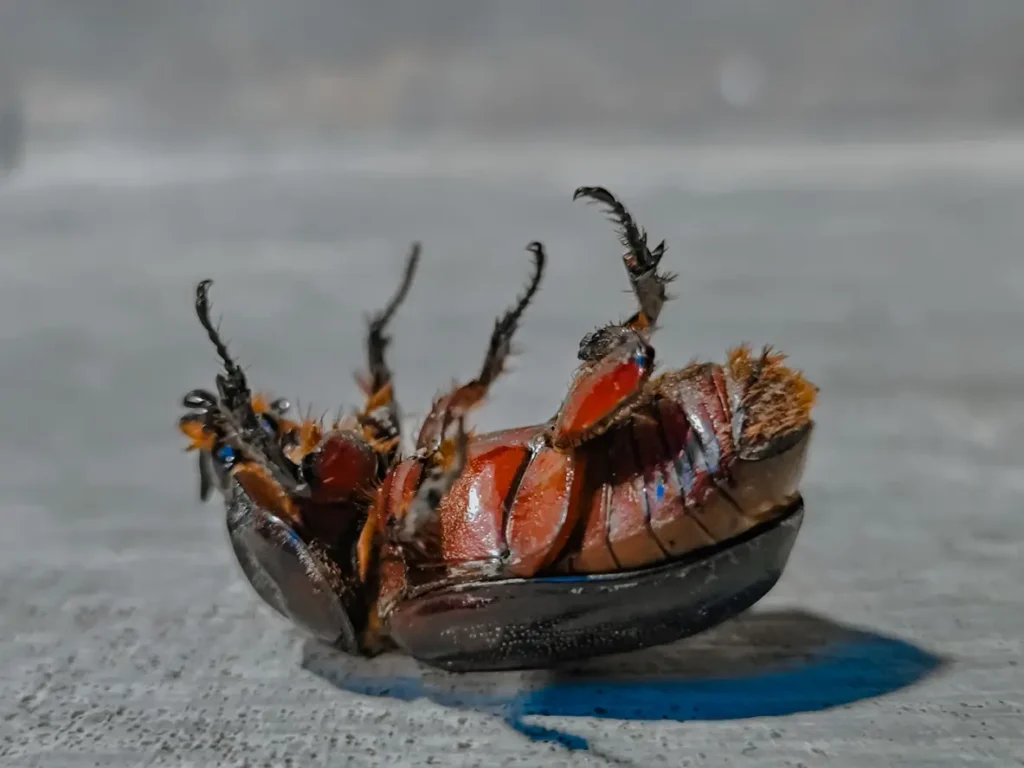
How To Get Rid of Beetles in Charleston, SC
The key to successful beetle control is matching the treatment to the beetle. Carpet beetles attack natural fibers and stored items. Pantry beetles and weevils spread through dry goods. Wood-boring beetles (powderpost types) target damp or unfinished wood. Because different beetles require different strategies, a one-size-fits-all spray rarely works—and may even push pests deeper into cracks and voids.
A Charleston-smart plan focuses on four things: species identification, habitat/moisture corrections, targeted treatments, and exclusion and storage upgrades so problems don’t return.
- Identify precisely. We verify beetle type (carpet, pantry, wood-boring, or occasional invader) and map where each life stage is active—larvae in fabrics or food, adults at windows and lights, and emergence points in wood.
- Fix what attracts them. Reduce humidity with bath fans and dehumidifiers; maintain crawl-space vapor barriers or encapsulation; extend downspouts and correct low spots that hold water near piers or slab edges.
- Treat where beetles live—not where you do. We place professional products into cracks, crevices, voids, and targeted surfaces (like baseboards, cabinet seams, and joist bays) instead of broadcasting across living areas.
- Upgrade storage/exclusion. Airtight containers for pantry goods, sealed plastic bins for textiles and keepsakes, door sweeps and weatherstripping at thresholds, and pest-rated screens for attic/gable vents and masonry weep holes that still allow airflow.
DIY steps (vacuuming, laundering, discarding infested goods) help, but Charleston’s humidity can quickly reset conditions. When we combine your efforts with our targeted treatments and moisture corrections, results last.
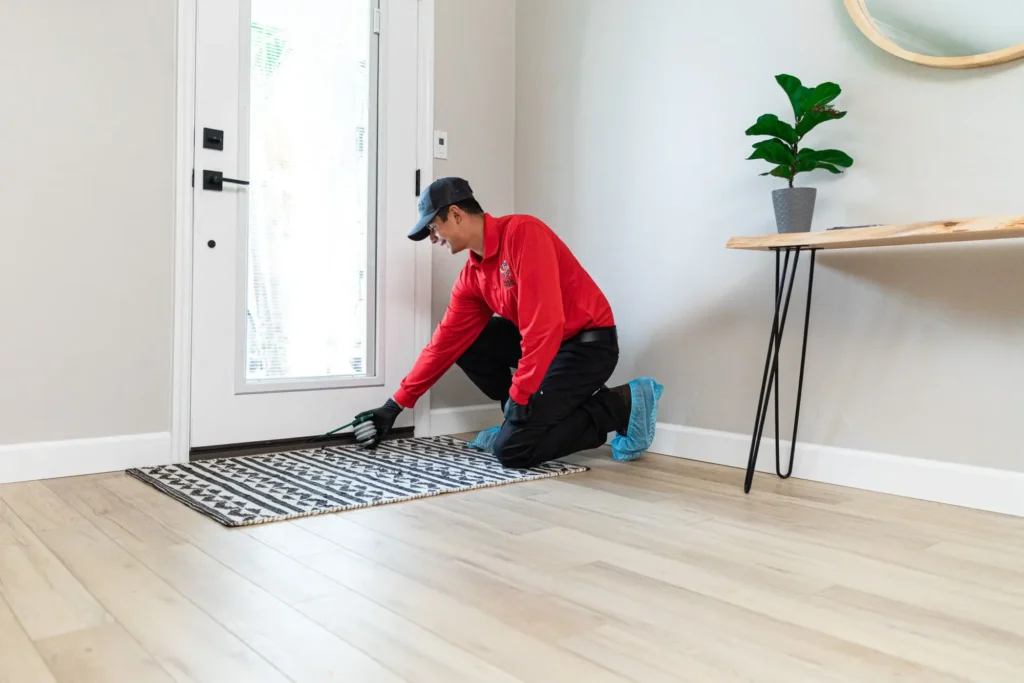
Beetle Treatment in Charleston, SC
Our process is built for the Lowcountry’s climate, housing styles, and microclimates—from shaded courtyards downtown to river-breeze neighborhoods and oak-canopy streets.
Initial Inspection
We perform a crawl-to-attic assessment: baseboards, closets, and built-ins; under rugs and furniture; utility and plumbing penetrations; pantry shelves and pet-food storage; attic joists and subflooring; and exterior transitions where turf, mulch, and foundation meet. We note moisture sources (gutter leaks, poor grading, condensate discharge) and structural gaps (door sweeps, vent screens, weep holes). You receive photos, species ID, and a plan prioritized by risk and budget.
Initial Treatment
We schedule treatment for a weather-wise window and work efficiently within a tight service window.
- Interior precision. Crack-and-crevice applications at baseboards and cabinet seams; dust placements in select voids (behind switch plates, under sinks, in toe-kicks); discreet baits or monitors where appropriate.
- Pantry stabilization. Targeted void treatments around cabinets, plus guidance to discard, decant, and deep-clean so larvae and eggs don’t reseed shelves.
- Textile protection. Recommendations for laundering on hot, freezing susceptible items, and storing off-season clothing, linens, and keepsakes in sealed bins.
- Exterior perimeter. Treatments at entry points (door thresholds, sill/trim seams), structural cracks, and around porches and crawl-space entries; granular placements along key edges to intercept re-entry.
After service, you receive a detailed report listing products, placements, and next steps—including what to clean, keep, or toss.
Quarterly Prevention
Beetle pressure in Charleston rises with humidity and storm cycles. A light, quarterly exterior service paired with interior checks where needed keeps protection current. Each visit, we re-inspect high-risk zones, refresh placements, and update your moisture and storage plan so small issues never become big problems.
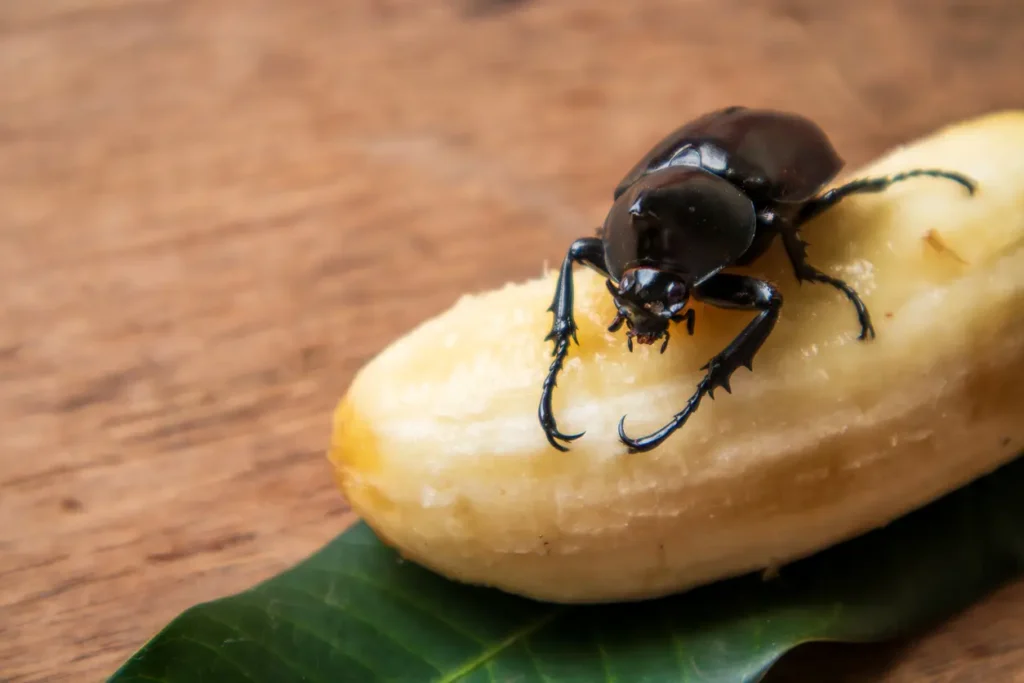
Signs of a Beetle Infestation in Charleston, SC
Catching problems early saves time and money. Look for these signs in Lowcountry homes:
- Live beetles near windows, lamps, or pantry shelves; tiny larvae (worm-like) in food packages or on closet floors.
- Exit or “shot” holes and fine powder (frass) on or below wood trim, floors, or furniture—possible powderpost activity.
- Fabric damage—irregular holes in wool, silk, or natural-fiber blends; thinning or bare patches on rugs near baseboards or under furniture.
- Pantry clues—pinholes in boxes, silky webbing or clumping in flour and cereal, gritty residue or off odors inside packages.
- Tiny dark droppings on shelves, along baseboards, or in storage bins.
If you see multiple indicators—or fresh frass reappears after cleaning—schedule an inspection so we can confirm species and stop the spread.
How To Check for Beetles
Work methodically, one zone at a time.
- Pantry: Empty shelves onto a light towel, inspect seams and corners, and sift fine goods over a tray to reveal larvae/webbing.
- Closets and storage: Shake and inspect woolens and natural fibers; vacuum closet edges; store valuables in sealed bins.
- Furniture and rugs: Lift cushions, check under furniture and along rug edges for cast skins, larvae, and feeding damage.
- Wood surfaces: Look for fresh, talc-like powder beneath trim or furniture; mark and recheck to confirm active emergence.
Bag suspect items for disposal. Photograph insects for quick ID; we’ll verify during your visit.
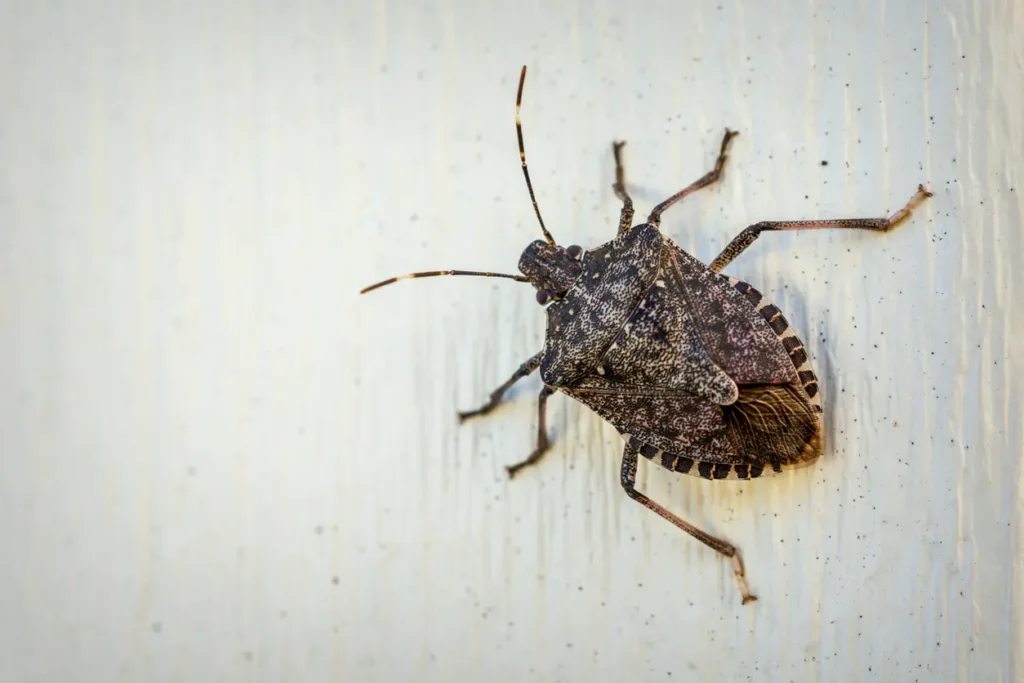
What Kinds of Beetles Are in Charleston, SC?
Carpet Beetles
Small, rounded beetles whose larvae feed on wool, silk, feathers, leather, and dried plant material. Damage often appears in hidden spots—beneath furniture, along baseboards, and in seldom-used closets. Control focuses on vacuuming, laundering, storage upgrades, and targeted treatments.
Powderpost (Wood-Boring) Beetles
These beetles infest unfinished or damp wood, leaving fine powder and tiny exit holes. They can show up in crawl-space timbers, hardwood floors, trim, or imported furniture. Solutions include moisture reduction, targeted treatments, and—when appropriate—surface finishing or selective replacement.
Pantry Beetles & Weevils
Indian meal moths, flour beetles, merchant grain beetles, and rice/granary weevils spread quickly through flour, cereals, rice, nuts, spices, and pet foods. The cure: discard infested goods, deep-clean shelves, decant into airtight containers, and use targeted void treatments and pheromone monitors to verify elimination.
Occasional Invaders
Ground beetles and click beetles may wander indoors around thresholds and garages, especially after heavy rain. Sealing entry points and adjusting lighting/landscaping ends these short-term incursions without heavy interior treatments.
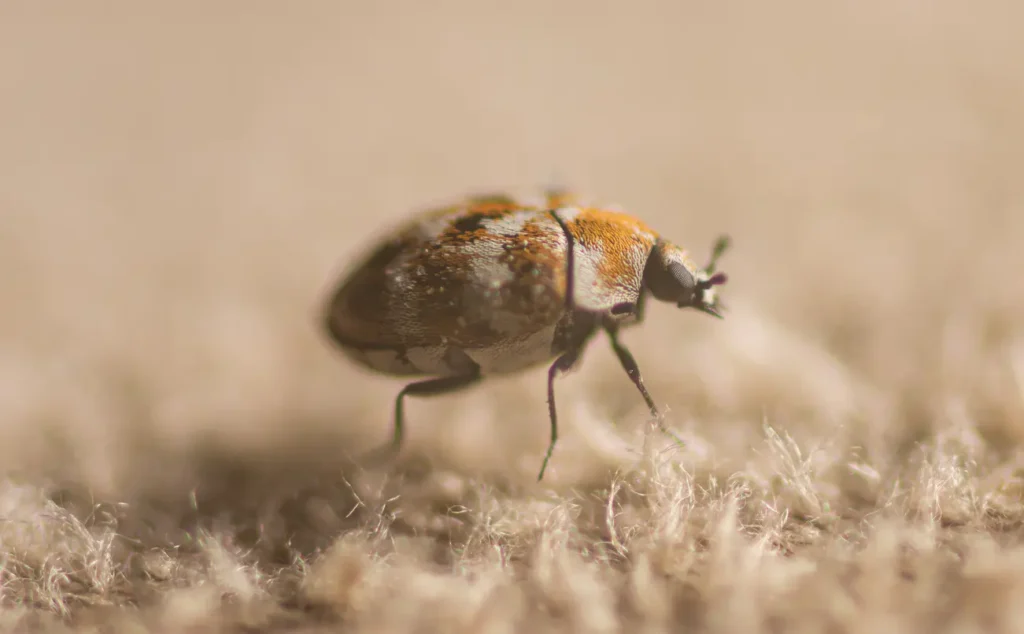
Eco-Friendly Solutions
We prioritize family- and pet-conscious service. Our IPM approach emphasizes non-chemical steps—sanitation, storage, exclusion, and moisture control—then adds precise, low-odor applications only where they deliver outsized impact. In sensitive areas, we can use desiccant dusts in sealed voids and botanical-based formulations as supplements to core controls.

How To Prevent Beetles in Charleston, SC
Prevention is a routine, not a one-time chore—especially in a humid, coastal city.
- Store smart. Decant grains, cereals, flour, and pet foods into airtight, gasketed containers; label dates and practice first-in, first-out.
- Protect textiles. Launder, vacuum, and store off-season items in sealed bins; avoid cardboard, which harbors dust and eggs.
- Manage moisture. Run bath fans, use dehumidifiers in damp rooms, maintain crawl-space vapor barriers/encapsulation, and extend downspouts away from the foundation.
- Harden entries. Add door sweeps, repair weatherstripping, screen gable/attic vents with pest-rated mesh, and install breathable weep-hole inserts in brick.
- Clean on a cadence. Vacuum baseboards and shelf seams; pull out appliances periodically to remove food debris and dust.
- Inspect new and secondhand items. Check furniture, rugs, and bulk pantry purchases before bringing them inside.
Don’t Let Beetles Take Over—Call the Charleston Pros
Beetles don’t have to define Lowcountry living. All U Need Pest Control delivers Charleston-specific beetle control that respects historic finishes, raised foundations, and coastal ecosystems. We identify the pest, correct the conditions, treat with precision, and keep protection current with simple, sustainable habits.
Ready for relief? Call 1 (888) 239-BUGS (1-888-239-2847) or request your free inspection online. We’ll respond quickly, create a plan that fits your home and budget, and follow through until your space is clean, quiet, and beetle-free.
Location Contact:
419 N Cedar St Summerville, SC 29483
Get Directions for 419 N Cedar StSummerville, SC 29483 on Google Maps843-489-8818
Call All "U" Need Pest Control